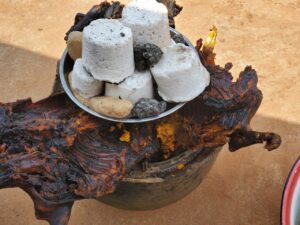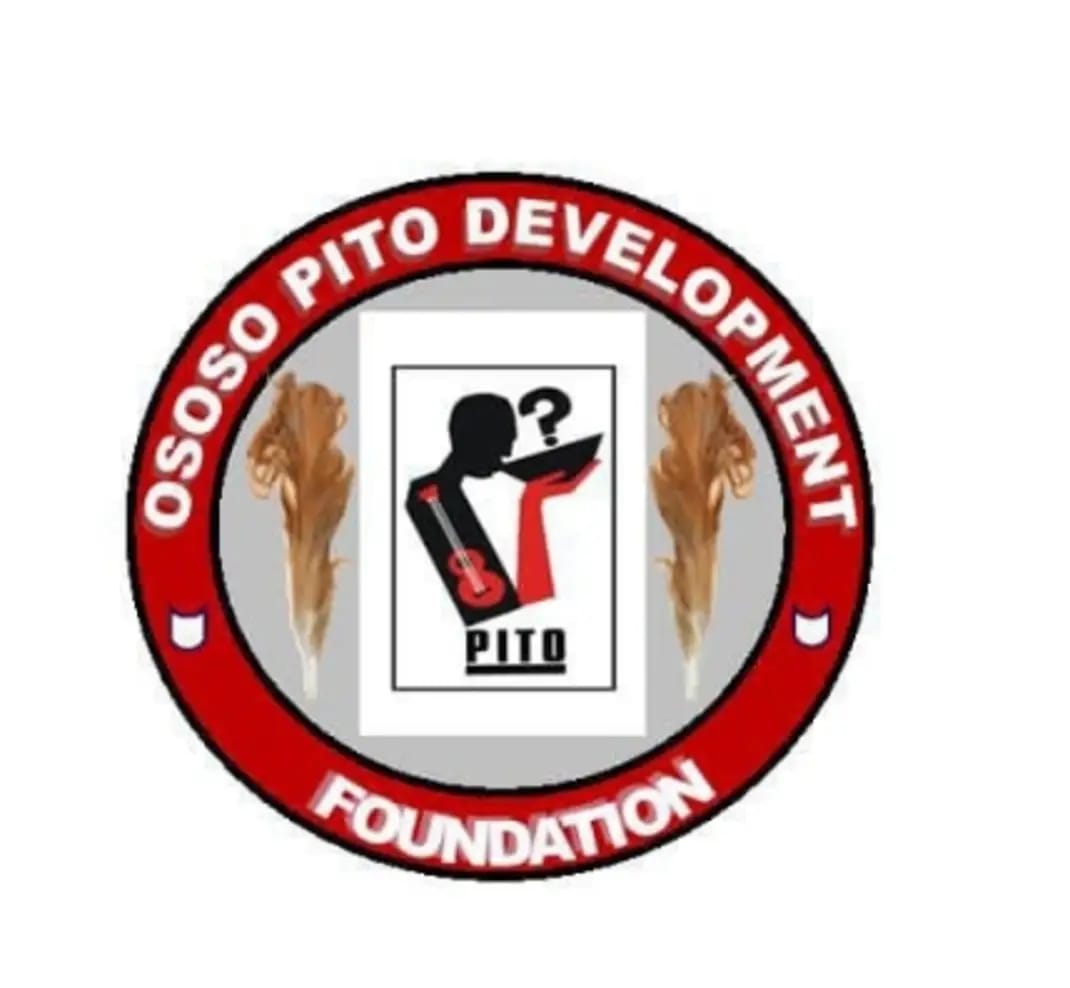In the heart of Edo North, the Ososo Kingdom comes alive every seven years to celebrate the Itakpo festival, a grand tradition that showcases the rich cultural heritage of the region. Under the esteemed leadership of HRH King (Oba) Bamidele Obaitan (Okuodu III), this momentous occasion brings together people from far and wide, including diaspora communities and neighboring regions in Nigeria.
Beyond its spectacle, the Itakpo festival holds profound cultural significance, empowering participants to take an active role in shaping the kingdom’s destiny. Those who partake in the festival are granted a recognized voice within the community, sitting alongside elders to contribute insights and decisions that impact the future of the kingdom.
The role of women in the festival’s success cannot be overstated. They work tirelessly to prepare for the celebration, providing nourishing food for the men who seclude themselves in the mountains for three days and nights. This period of isolation is an integral aspect of the festival’s rites and rituals, and the women’s contributions are vital to its success.
At the heart of the Itakpo festival lies a profound belief in the protective powers of the sacred mountain. The spirit of the ancestors is said to stand guard, preventing harm or malevolent intentions from affecting individuals through food. This belief underscores the spiritual and communal dimensions that are woven into the fabric of the festival.
The Age Group Graduation System in Ososo: A Rite of Passage
In Ososo, age groups play a vital role in the community, with six stages of progression: Ekua-lwewere, Ekuabhoko, Ekuabhirebho, Ekuawereya, Ekhuabhiretonorugbe, and Ekuadomi. Each stage has distinct responsibilities and privileges, ensuring individuals contribute meaningfully to the community and develop socially.
Ekua-lwewere (Early Adolescents)
- Potential future elders, with little contribution to communal discussions and efforts
Ekuabhoko (Young Adults)
- Fetch water and gather resources multiple times before advancing to the next stage
- No rights in elder gatherings, food sharing, or labor participation
Ekuabhirebho (Young Adults with Responsibilities)
- Contribute to social life, court and marry
- Assist Ekhuabhiretonorugbe, maintain town square sanitation, and perform duties without female involvement
- Chant militant songs, visit chiefs and elders, and receive blessings and refreshments
Ekuawereya (Rest and Preparation)
- Exempt from communal labor for seven years, preparing for Ekhuabhiretonorugbe
- Clear farm roads, cook pitto, and provide kola and wall nuts
Ekhuabhiretonorugbe (Leaders and Defenders)
- Most useful group in the community, vocal, forceful, and energetic
- Perform communal works, defend against invaders, and clear farm roads
- Embark on local pilgrimage, help with farm road clearing, and symbolically retire at the heap
Each stage builds upon the previous one, with individuals progressing through the age groups, taking on new responsibilities, and contributing to the community’s well-being. This system ensures a smooth transition from one stage to the next, fostering growth, cooperation, and social cohesion in Ososo.
The Ekhuabhiretonorugbe Pilgrimage and Ekuadomi Rehearsals
The Ekhuabhiretonorugbe group embarks on a pilgrimage, cleaning the route through Egbovie to lretonorugbe. Each member carries white cotton wool, dried bush meat, kola nuts, and cooked wall nuts. The cotton wool is placed in strategic locations, signifying the group’s presence and duty.
Upon arrival, members regroup at Egbovie, share food and drinks, and reaffirm their oath, which includes abstaining from adultery, stealing, and diabolical means. This oath aligns with the Biblical Ten Commandments.
The group returns home, sharing food and drinks with the community, and is welcomed as heroes (Okhogbe). They then regroup for merry-making, presenting food and drinks to their senior group, Ekuadomi.
Ekuadomi, the elder group, rehearses annually, providing pounded yam, pitto, and egusi soup. They assemble at Unukhuat Osuno, the seat of the elder’s council, and share food and drinks after offering prayers. The group leader collects kola nuts and pitto from members, and any low-quality pitto is rejected.
The celebration spills over to the next day, with dancing and visits to relations and well-wishers. The Ogbajieku, a leader of the leading kindred, starts the dancing, carrying two horse tails. The merry-making continues for nine days, with participants addressed as “Okhogbe” (Hero).
On the ninth day, the group assembles to discuss achievements and mistakes, and the age group leader organizes a final gathering to mark the end of the annual preparations. They share “Attokhe” (general drink) and take a date for their celebration, which is decided by the elder’s council and group leaders. The celebration takes off on the ninth day after the last meeting (Obesa), and invitation cards are sent out to inform participants, friends, relations, and well-wishers.
Day One:
- The public relations and welfare officers, Ekhemeni, collect yams and kola nuts from participants, symbolizing acceptance and participation.
- The kola nuts are shared among the immediate elder age group, chiefs, and leaders, while the yams are kept for the senior age group to decide their fate and use.
- The day is also an exhibition day, where participants display gifts received from friends, relations, and well-wishers. These gifts range from yams, goats, birds, salt, melon, locust beans, cows, umbrellas, clothes, and even vehicles.
- The celebrant prepares for a three-day camping trip to Egbazo Rock, while the junior age group, Ekuairetonorugbe, keeps the town safe and carries messages to and from the camping ground.
Day Two:
- The participants set out for the camping trip, a journey that commemorates the history of the Ososo people.
- A special bean cake, Moimoi (IREZO), is prepared with dried bush meat for the celebrant to take along.
- At the age group elder’s house, a pot of pitto is kept, and participants serve themselves before embarking on the journey.
- The journey is not compulsory for all participants, but the leaders of the age group must attend. The immediate senior group sends a leader to accompany them, and a life He-goat is carried along to Enidegbe.
- The purpose of the journey is to show sincerity, and the life fowl is dropped at Adikhorikho, while the He-goat is slaughtered and carried back home for eating.
- At Enidegbe, prayers are said for the country, the clan head of Ososo, the graduating age group, and the entire Ososo community.
- The participants return to Egbazo, and the elder shoots a gun, signaling the start of dancing and eating.
- The entire town is thrown into jubilation, and the age group retires to Egbazo for camping.
Day Three:
- The participants return home to join their families and well-wishers.
- Food and drinks are sent to the camp, and the participants dress in the same clothes, awaiting their senior age group elders to come for the pronouncement of their return.
- A she-goat is given to the senior age group leaders as homage, and the celebrants pay a certain amount for their immediate needs.
- The senior age group leaders do not come to the camp until they have feasted and finished with the drinks and the she-goat offered to them.
- The celebrants are dressed in the same color cloth with beads, horsetails, and an umbrella. Only the leaders, Egbaji, carry two horsetails for identification.
- The celebrants put on their umbrellas over their heads and line up as the senior group guides them home.
- The leaders demand their new name, which stands as their graduation name. The celebrants are called by the name thrice, and the leaders pray for them, the clan head of Ososo, and the entire Ososo community for long life and prosperity.
- The celebrants are then ordered to come home, and their immediate junior age group joins in ushering them home from the camping ground.
- The entire town is thrown into jubilation, and songs like “Eneyibo Ejieseo” are sung to welcome them back.
- The celebrants leave the camp and join their relations at a strategic point, where women and non-natives are waiting with music, dances, and pageantry to welcome them.
- The celebrants are welcomed with music, dances, and pageantry at Irebho.
- A she-goat is slaughtered, and the blood is put across the entrance to Irebho.
- The Ugbedu Okporikpo and Ubereni kindred await the celebrants to dance the music of “Ituetue” and “Arigede” to the admiration of the elders (male and female) of the kindred.
- The celebrants pay the sum of 20 kobo (now increased to N20) to the kindred, and any celebrant can pay more as a sign of appreciation.
- The celebrants then go straight to their fathers’ graves to pay homage, and for those whose fathers are still alive, they go to show appreciation and receive blessings.
- The elder women of the family dance “Usheduo” music, meaning one has excelled, and they dance from one celebrant’s house to another.
- The celebrants join in the dancing and spray the elder women with money as a sign of appreciation.
- The celebrants are now addressed as “Okhogbe” (Heroes) and wear their coral beads, carrying their horse tails and often with a cap to match.
- They no longer shake hands with each other; instead, they use their horse tails to knock on each other’s hands as a sign of greeting.
- Minor activities take place the following day, with merry-making and receiving of visitors from far and near.
Day Four:
- All celebrants donate a life goat each to their respective kindreds. The goat must be bought by the celebrant’s eldest son.
- Other gifts may accompany the goat.
- The goats are taken to the eldest member of the kindred’s house, where they are slaughtered and shared equitably after removal of the livers, heart, kidney, and breast.
- The sharing includes those who are not present or did not return home for the celebration.
- Only males partake in the sharing of the goat meat, as females are not considered to have a right to their father’s home.
- Male children born into the kindred participate in the sharing.
Songs Used Before and During the Celebration of Itakpo:
- Akharoregbemu (meaning “we should be getting ready”) is sung throughout the seven years of preparation.
- Odumaduke (meaning “this is the task ahead”) is an inspiring song sung during the celebration.
- Aghana miegbe otunu fiebe Aghana mieqbe (meaning “this is the time to prove it to those who are mouthy”) is sung to remind those who were accused of not being capable to participate due to resources.
- Kanadhoya Omomanerneh Kanadhoya (meaning “open your eyes clearly to me, those of you who do not know me”) is sung by those who were underrated.
- Ememekhi Uqboti akhenabhojio Ememeh (meaning “I am the pricking thorns in the palm nuts that everyone avoids to avert being injured”) is sung by those who were considered weak.
- Aqbodhe nameo Bhadimefia (meaning “those of you my fans, thanks for cheering me”) is an inspiring song sung by women and girls dancing around the town.
- Eneyibo Ejieseo (meaning “those who traveled to the white man’s land are back”) is sung by spectators on the day of decamping.
- Enegbunuo Eqbunuo (meaning “this is wonderful”) is sung when the bowl of pounded yam and pot of soup are carried to the camping square.
- Agbodhenameo Bhadwriefia (meaning “those of you who are my fans, thanks for cheering me”) is sung by celebrants.
- Igele Oyiokiobo Ame Igeloyiokiobo Ame (meaning “a beautiful woman’s scaff that went to an international market and returned successfully”) is sung by celebrants.
- Enekhifame bhukhe Elkoeklmeo (meaning “if I can survive these expenses, break through, let it not repeat itself anymore”) is sung by celebrants.
Change of Baton:
- This marks the end of the celebration and the transition to a new status for the celebrants.
- The final ceremony takes place after three months, where all celebrants converge to share drinks and mark the end of the celebration.
- They are then addressed as elders and are eligible to take on hereditary titles or chieftaincy roles.
- The name given to them on the last day of decamping remains with them throughout their lifetime and serves as an identifier for their age group.
As a celebration of tradition, community, and cultural heritage, the Itakpo festival stands as a testament to the enduring spirit of the Ososo Kingdom. Join us in honoring this remarkable tradition and the people who bring it to life.















